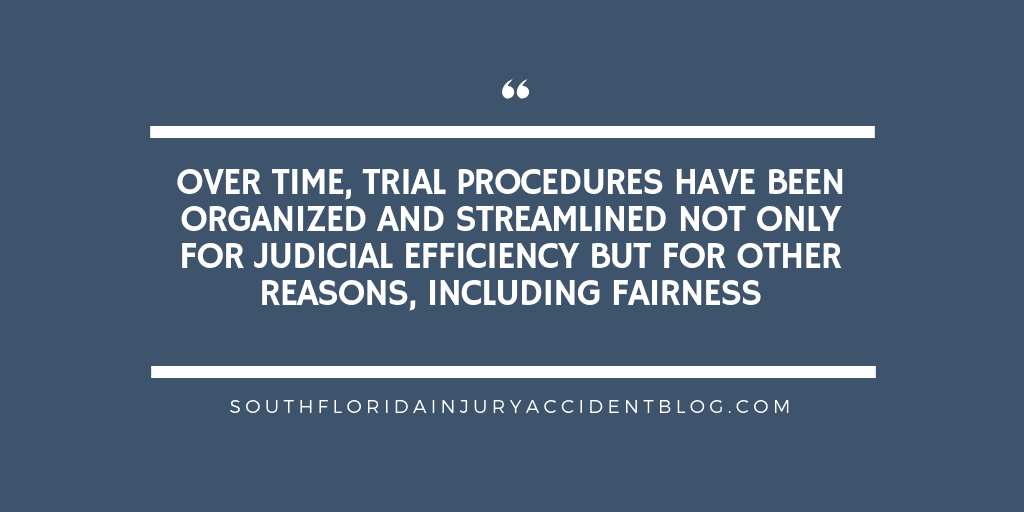Last Update: 10/13/19
When someone is seriously injured and a lawsuit is filed, the jury is asked to follow specific instructions on how to calculate an amount to make the victim whole again.
Substantive laws (negligence, premises liability, negligent security, etc.) and procedural laws govern how the case moves from filing to the moment when the jury comes back with its verdict (and thereafter in the appellate process).
Florida Jury Instructions Given in Florida Personal Injury and Property Damage Cases
Florida court procedure is organized statewide. Over time, trial procedures have been organized and streamlined not only for judicial efficiency but for other reasons, including fairness. For example, a defendant in Tampa should expect to receive the same treatment by a jury as someone in Orlando or Key West.
Accordingly, the Florida Supreme Court oversees the wording of the instructions given to Florida juries, which are published and provided to lower court judges and counsel after the High Court has determined the proper wording of these instructions (and after inviting commentary from anyone with an interest in doing so).
Florida Jury Instructions for General Negligence Cases – Jury Decides Compensation for the Victim
Florida Jury Instructions are detailed and are sometimes complicated; however, one thing is clear – juries decide two main issues in a negligence case, liability and damages. The jury first decides whether or not the defendant is liable to the plaintiff. Then, if the defendant is found liable, the jury is then instructed to determine the amount and type of damages to award to the plaintiff.
For instance, here is the Jury Instruction for Liability and Damages in a case involving personal injury and property damage (Instruction 501.1):
If your verdict is for (defendant), you will not consider the matter of damages. But if the greater weight of the evidence supports (claimant’s) claim, you should determine and write on the verdict form, in dollars, the total amount of [loss] [injury] [or] [damage] which the greater weight of the evidence shows will fairly and adequately compensate [him] [her] for [his] [her] [loss] [injury] [or] [damage], including any damages that (claimant) is reasonably certain to incur or experience in the future. You shall consider the following elements: ….

4 Types of Damages That Can Be Considered in a Personal Injury Lawsuit
The following are examples of damages that a jury may award as compensation to an injury victim under Florida’s Standard Jury Instructions (the exact language below is from the instructions):
1. Injury, pain, disability, disfigurement, loss of capacity for enjoyment of life
Any bodily injury sustained by (name) and any resulting pain and suffering [disability or physical impairment] [disfigurement] [mental anguish] [inconvenience] [or] [loss of capacity for the enjoyment of life] experienced in the past [or to be experienced in the future]. There is no exact standard for measuring such damage. The amount should be fair and just in light of the evidence.
2. Medical expenses
Care and treatment of claimant: The reasonable [value] [or] [expense] of [hospitalization and] medical [and nursing] care and treatment necessarily or reasonably obtained by (claimant) in the past [or to be so obtained in the future].
3. Lost earnings, lost time, lost earning capacity
When lost earnings or lost working time shown: [Any earnings] [Any working time] lost in the past [and any loss of ability to earn money in the future].
4. Spouse’s loss of consortium and services
On the claim brought by (spouse), you should award (spouse) an amount of money which the greater weight of the evidence shows will fairly and adequately compensate (spouse) for any loss by reason of [his wife’s] [her husband’s] injury, of [his] [her] services, comfort, society and attention in the past [and in the future] caused by the incident in question.
These jury instructions relate to general damages. However, there are other types of damages that may be awarded to a personal injury victim, e.g., punitive damages, wrongful death damages, and damages when the plaintiff is a minor child.
Read: Personal Injury Damages
No two personal injury trials are identical. What damages can be considered by a Florida jury and the amount of damages that can be assessed is different in every case — each case has its own legal issues to consider and fact patterns to analyze. Assessing the potential award in a case depends on a variety of factors, including the testimony of experts and the evidence that is admitted by the court.
Read: Settlement Values Of Personal Injury Cases
What Should You Do?
A good piece of advice if you have been harmed in an accident due to negligence, is to speak with an experienced personal injury lawyer before you file a lawsuit to learn about some of the issues that can arise with these claims, including the type of evidence needed to prove a claim and how most juries respond to certain damage claims. Most personal injury lawyers, like Alan Sackrin, will offer a free initial consultation (over the phone or in person) to answer your questions.
Related:
- How Can I Get Maximum Compensation for My Injury Case?
- How Do Florida Juries Decide Damage Awards When The Victim Has A “Pre-Existing Condition?”
_______________
 Do you have questions or comments? Then please feel free to send Alan an email or call him now at (954) 458-8655.
Do you have questions or comments? Then please feel free to send Alan an email or call him now at (954) 458-8655.
If you found this information helpful, please share this article and bookmark it for your future reference.
